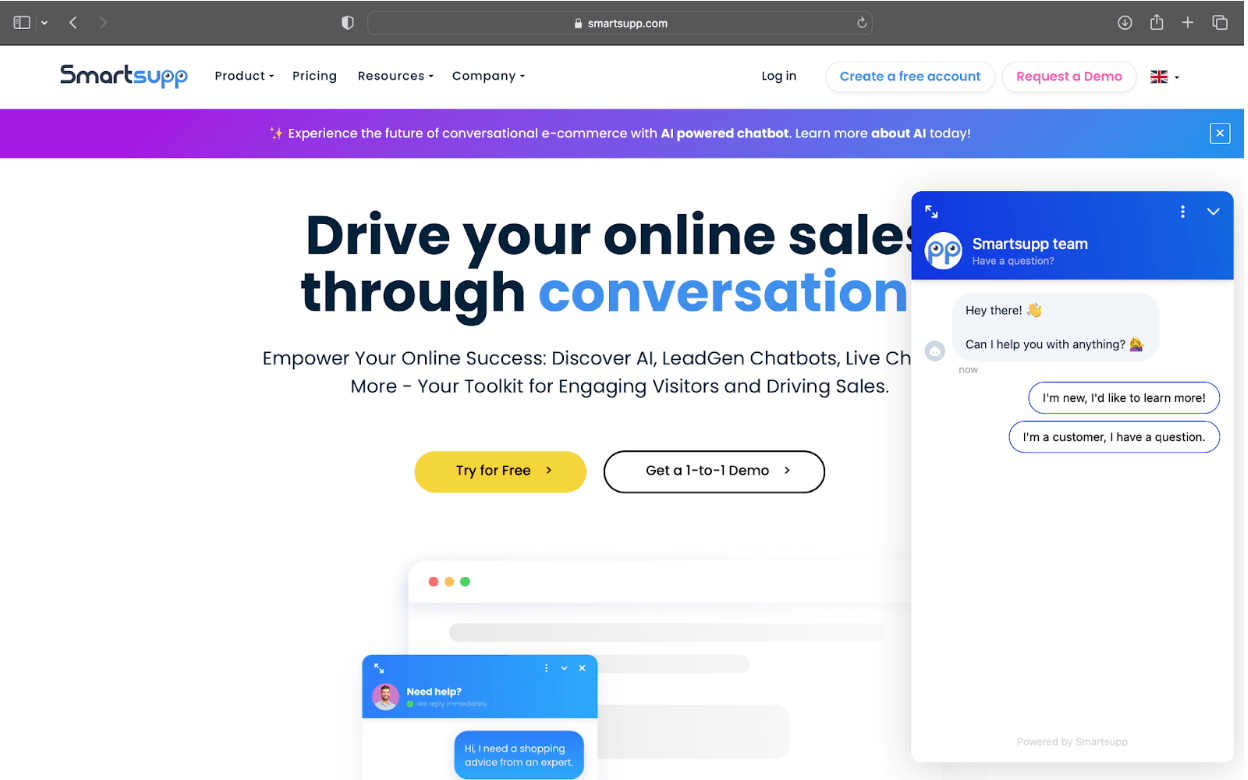Tags
The 7 Most Popular Chatbots for Shopify Ecommerce Stores in 2024, Ranked
We evaluated the 7 most popular Shopify chatbots for quality, ease of use, value for money, and scalability.
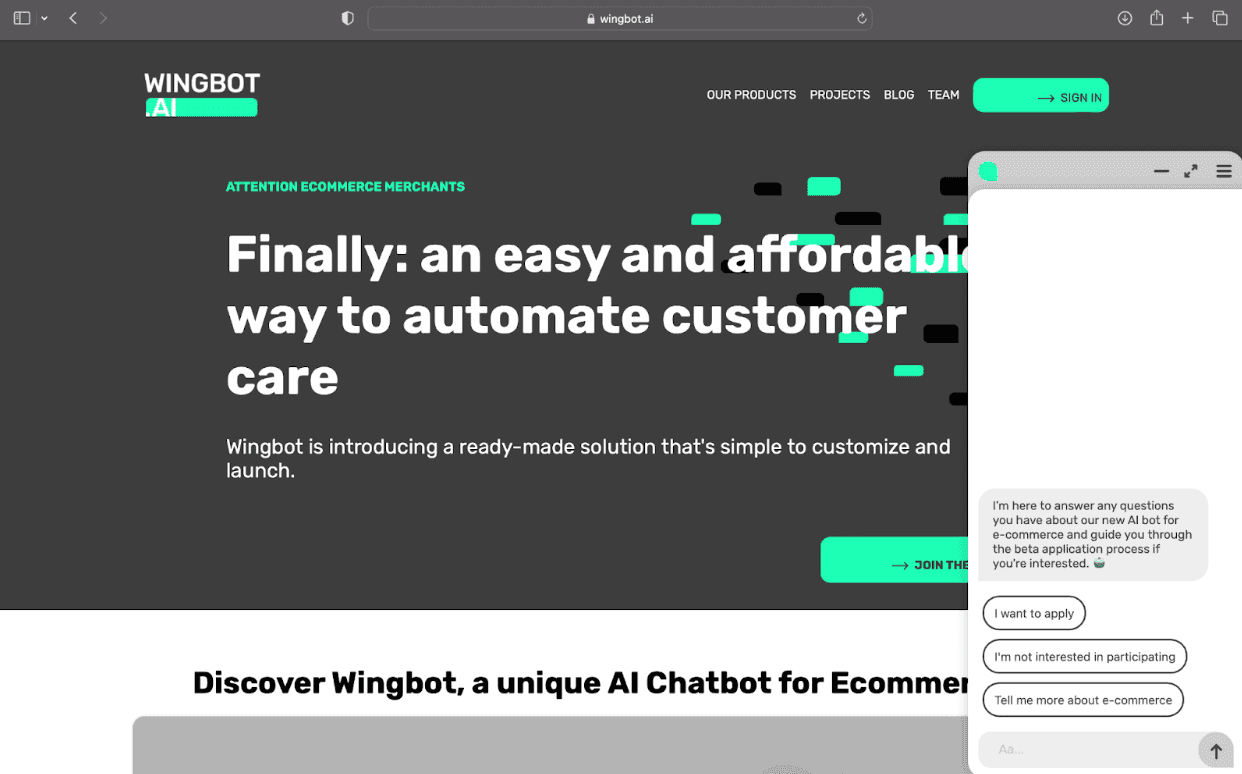
If you run a business with Shopify, you know single-handedly managing customer care can be a lot. Answering questions like “When will my order arrive?” and “Are you open right now?” isn’t how you want to spend Saturday night. And in a world where AI drives cars and saves lives, you shouldn’t have to. Maybe you’ve considered investing in an ecommerce chatbot. Proven to increase conversion rates by up to 67%, boost lead generation, increase sales and improve customer satisfaction, chatbots have become core to an ecommerce growth strategy. The best ones offer robust support throughout the customer’s entire purchasing journey, from product selection to delivery, and enhance customer loyalty with a personalized, high-touch approach. Their contributions to your bottom line are no joke: Chatbot transactions for ecommerce shops are projected to amount to $112 billion by 2023.
But not all chatbots can achieve those results. Most aren’t powered by AI. Others may be built on strong tech, but aren’t designed for a business like yours. Maybe they lack personalization features, or they’re designed for a specific sales function, like social media leads, when what you need is a more web-focused solution. By the time you figure this out you’ve paid the $100 upfront fee, ouch! The truth is, chatbot companies spend a lot of money on marketing, and marketing can obscure the hard facts you need to make decisions.
Wingbot is here to help. Our research lead Sabina downloaded the 5 most popular Shopify chatbots online and evaluated them for what really matters: what can the bot actually do? Is it easy to use? What’s the value for money? We focused on their unique features, scalability, integration depth with Shopify, and price, for a level comparison. Our guide will help you choose the bot that’s right for you.
1. Wingbot.ai
The gist: A Wingbot can automate up to 90% of customer queries, significantly reducing your workload and increasing quality of care. Its chatbots come pre-trained, are easy to customize and require essentially zero upkeep. The bot was built for Shopify with small business owners in mind, so the user experience is frictionless.
Easy to install? Even at its lowest price tier, Wingbot offers one-click setup and builds the bot for you, so you don’t have to mess around with any templates.You can customize it to match your business’s style, with options for look and voice.
Pre-trained? Yes, Wingbot takes care of this. The bot scans your website for info about your business, so you’ll just have to fill in the occasional gap.
Integration level: High. The bot supports omnichannel integration, provides order tracking, support with cancellations & returns, and features a smart product guide. The company spent lots of time and money optimizing the bot for the most pleasant, meaningful user experience possible.
Automation rate: Up to 90%
Personalization: You can personalize the bot to match your business’s look and tone.
Customer recognition: Yes
Escalation: Live chat, ticketing, and escalation so reaching a real person is simple.
Analytics: Strong analytics platform and self-optimizing capabilities (the bot is built with a machine learning-style algorithm that improves itself over time.) AI: Every Wingbot is built with natural language processing AI, so it gets faster and more efficient over time. And it comes with the latest OpenAI tech built in so it has all the same capabilities as ChatG*T.
Languages: Currently English and Czech.
Conclusion: The only option if you’re looking to go hands-off and seriously enhance customer experience.
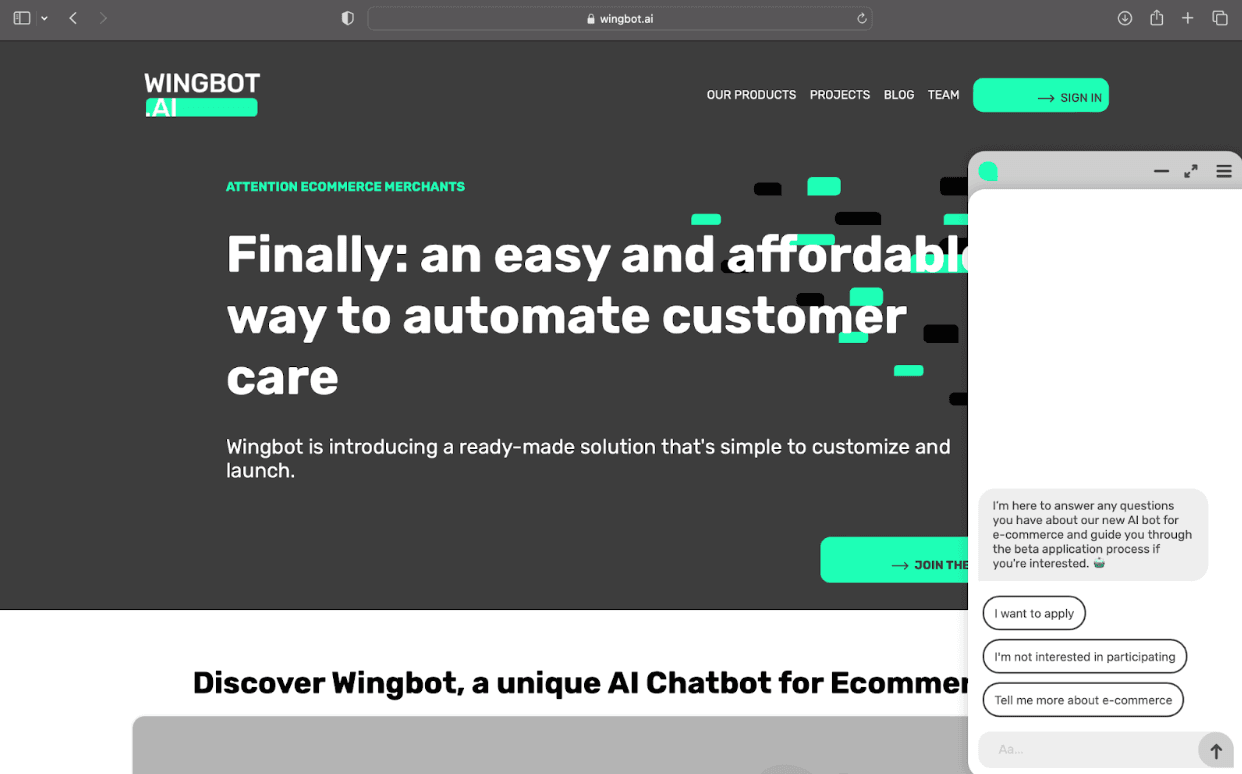
2. Tidio
The gist: This is the sort of bot that organizes your customer care first, and automates things second. And importantly, unless you’re paying for the pricey premium plan, the bot isn’t built with AI, which limits the chatbot’s automation rate. There’s no order tracking or return/cancellation automation, and you have to build the bot yourself, which can be frustrating.
Easy to install? Fairly simple setup compared to some other bots out there (cough, Intercom.) Tidio’s chatbots are DIY, so you’ll have to design it yourself using one of their templates, which are easy to use.
Pre-trained? You can give the bot a link to your website that contains FAQs and it will auto-generate responses. But if you don’t have this page, you’ll need to spend some time generating responses.
Integration level: Medium. The bot is omnichannel (so good for businesses that sell across social platforms) but it doesn’t provide order tracking, support with cancellations & returns, or offer product recommendations.
Pricing: Free trial? Yes, for one week. Communicator plan - $25 /member (+ $25 every other member) Chatbots plan - $29 /2k visitors (cca + $7,8 every other 1k visitors) Lyro AI plan - $39 /50 conversations (cca + $37 every other 50 conversations) Email marketing - $10 /2,5k emails (cca + $9,8 every other 2,5k emails) Tidio branding add-on - $20
Automation rate: 75% (resolution rate for Lyro is 70%)
Personalization: Very limited. You can choose whether or not the bot uses emojis.
Customer recognition: Yes, though it’s a little unclear how helpful this is since the bot doesn’t offer product recommendations.
Escalation: Their bots offer live chat and ticket escalation so reaching a real person is simple.
Analytics: Robust (provides data on customer satisfaction ratings, response time, operator performance, revenue generated with the help of the chatbot.)
AI: Their chatbots don’t use AI, but their new e-commerce offering Lyro, offers LLM and ChatGPT 3.5 on the operator side (to help you respond with good grammar, etc.)
Languages: English, Spanish, German, Portuguese, French, Dutch, and Italian
Conclusion: Best suited for a larger business with an in-house customer service already in place.
3. Shopify Inbox
The gist: A bad choice (in our humble opinion) if you’re looking to automate a big part of your workload. Shopify’s “in-house solution” chatbot offers the bare minimum for businesses looking to automate customer care (sorry Shopify, we still love you.) It’s best for live chatting (that’s when you, the business owner, respond to a customer’s questions live through a chatbot interface.) This means you’re still going to be doing all the work.
Easy to install? Fairly simple DIY setup takes some time because you need to tell the bot what to say to questions like “When does the store open.”
Pre-trained? No. You’ll need to tell it what to say, even for basic questions.
Integration level: There’s order tracking and product recommendations. Nice!
Pricing: Part of your Shopify subscription
Automation rate: They don’t disclose it.
Personalization: No, every bot looks and talks the same.
Customer recognition: Yes.
Escalation: There’s live chat and ticketing.
Analytics: Pretty bare bones. Shows you a record of conversations and tracks response time.
AI: Comes with LLM AI to help you (the business owner) respond to customer questions. No ChatGPT functionality.
Languages: English
Conclusion: Bare bones, not much value add, but sort of free!
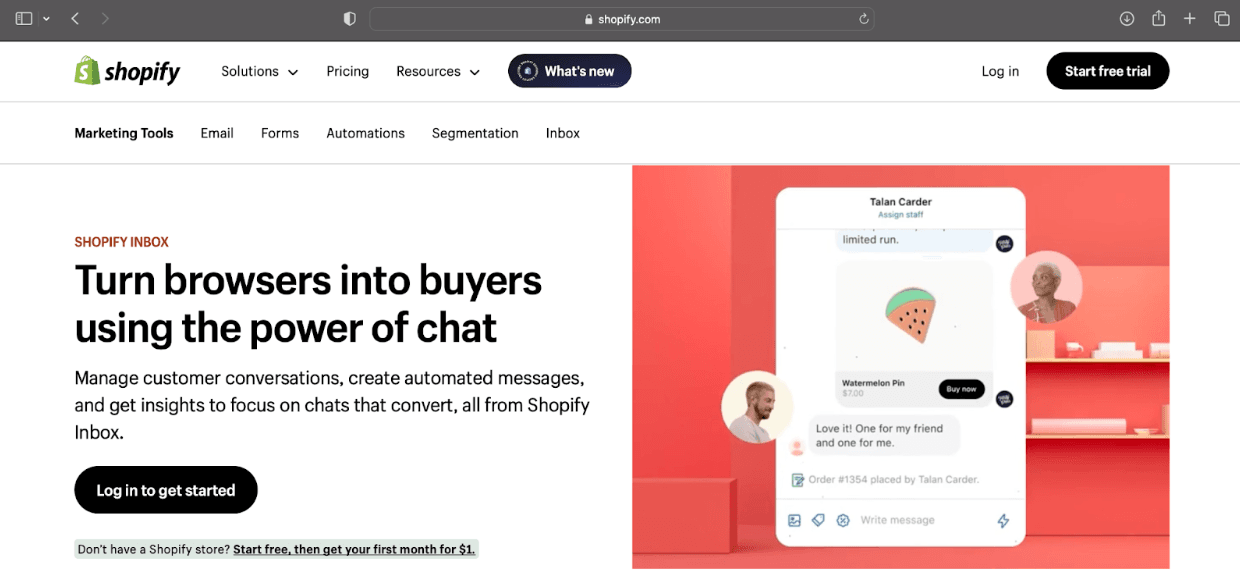
4. Chatra
The gist: Primarily a live chat tool (that’s when you, the business owner, talk to the customer through the chatbot interface.) The Chatra bot gives you the ability to automate CRM by creating something called a “trigger.” This means that you can choose a scenario where the chatbot will be triggered to appear (such for example when user is on some specific URL and some specific amount of time was spent on that page). It then gives the customer service agent information about the visitor so they can service them better, (name, online, location, page, referrer, os, cart, total.)
Easy to install? Yes. One-click setup. That’s nice.
Conversation quality: If the customer asks a question that hasn’t been designated as a “trigger,” they are connected with a live agent right away. The bot has very limited ability to automate conversations or answer FAQs.
Pre-trained? No. DIY set-up. A few pre-made triggers are offered, but you have to design it for the most part yourself.
Integration level: No order tracking, no cancellations or returns, no recommendations. A smart product guide that sends links but there’s no in-chat viewing.
Omnichannel: Yes, you can talk to customers across social platforms
Pricing: 10 day free trial and a free plan offered.
Automation rate: They don’t disclose it.
Personalization: No
Customer recognition: Yes, but customer data isn’t stored, so you can’t offer a recommendation based on past purchases.
Escalation: Yes, live chat and ticketing.
Analytics: Yes.
AI: No AI, can’t recognize keywords.
Languages: English, German, French, Spanish, Polish, Dutch, Italian, Russian
Conclusion: Limited automation capacity. Won’t significantly reduce your workload. And the “trigger” thing is, in our opinion.

5. Intercom
The gist: The most complicated and hard-to-use of the chatbots we tried. Intercom’s enterprise solutions are used by Microsoft and Meta, so it’s clearly a robust CRM platform. But on a DTC e-commerce level, their chatbot offering is pretty confusing, and seems to focus more on organization than automation. It only has a 50% conversion rate, compared to Tidio’s 70% and Wingbot’s 75%.
Easy to install? No, overwhelming. It takes a while to get to know the platform.
Pre-trained? No.
Integration level: There’s order tracking but no cancellations/returns management or recommendations. There’s a smart product guide.
Pricing: 2 week free trial. Essential - 39$ per seat/monthly (The customer support plan for individuals, startups, and small businesses) Advanced - 99$ per seat/monthly (Powerful automation tools and AI features for growing support teams) Expert - 139$ per seat/monthly (Collaboration, security and reporting tools for large support teams) Proactive Support Plus (Product tours, checklists, surveys) - $499/monthly, 3000 messages sent/monthly Fin AI chatbot - $0.99 per resolution
Automation rate: Can resolve about 50% of customer questions. On the operator assistance side, it helps you compose messages to customers, summarize things, and recognizes keywords.
Personalization: No
Customer recognition: Yes (it remembers what customers have ordered in the past.)
Omnichannel: Yes but the bot needs to be installed separately on each one.
Escalation: Live chat and ticketing.
Analytics: There’s a robust analytics platform but it’s rather chaotic.
AI: Yes but it’s all on the operator assistance side (it helps you write to customers and summarizes a customer’s problem so you can help them more quickly.)
Languages: Speaks 43 languages
Conclusion: A good software for a bigger business with an in-house customer service team.
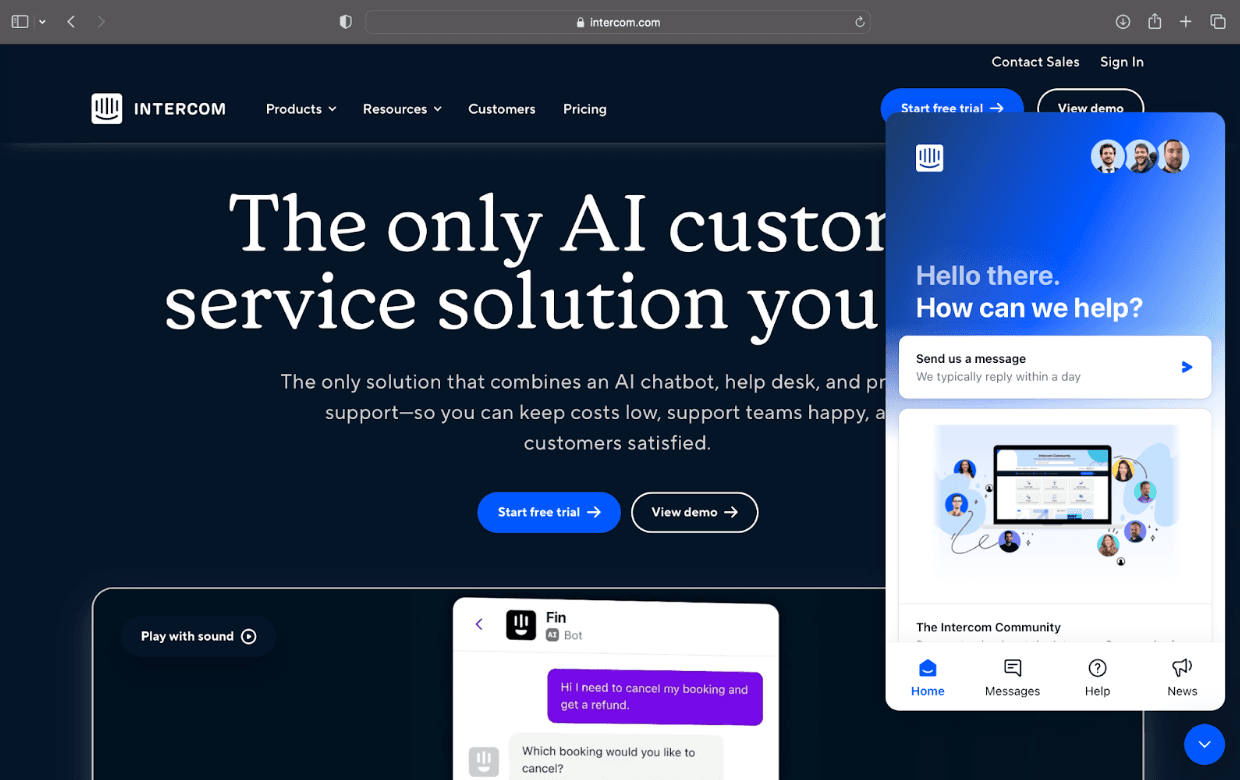
6. Manifest AI chatbot
The gist: A good product guide bot, but doesn’t reduce customer care workload. This new live-chat bot advertises itself as a “shopping assistant,” which is different from a customer care assistant. It’s key benefits are product recommendations. A customer can ask which products are trending, for example.
Easy to install? The bot comes pre-built, no DIY required, but you need to add the answers to FAQs manually.
Pre-trained? No, the operator needs to add answers to FAQs, but it does possess a pretty intuitive understanding of the products offered. Integration level: Product recommendations, smart product guide, order tracking, but no cancellations/returns management.
Pricing:
Starter - 33$/month billed annually, 39$/month billed monthly (1000/month GPT messages, up to 2000 products supported, train with 60 custom data sources, shopify Inbox & Gorgias integration, basic welcome AI pop-ups) Growth - 208$/month billed annually, 249$/month billed montly (7,500/month GPT Messages, 20000 Products Catalog Limitations, train with 260 custom data sources, remove Manifest branding, customize conversation starters) Scale -666$/month billed annually, 799$/month billed montly (30,000/month GPT Messages, unlimited products supported, unlimited custom data sources, custom on-demand integrations, dedicated success manager)
Automation rate: Increases “Add to Cart” rate by about 4.5%
Personalization: Yes
Customer recognition: No
Omnichannel: No
Escalation: Yes
Analytics: Yes. Fairly robust.
AI: Yes, AI shopping assistant
Languages: Over 95 languages
Conclusion: Strong product guide, helpful if you sell a LOT of different or hard-to-understand things (like if you run a hardware store, for example.)
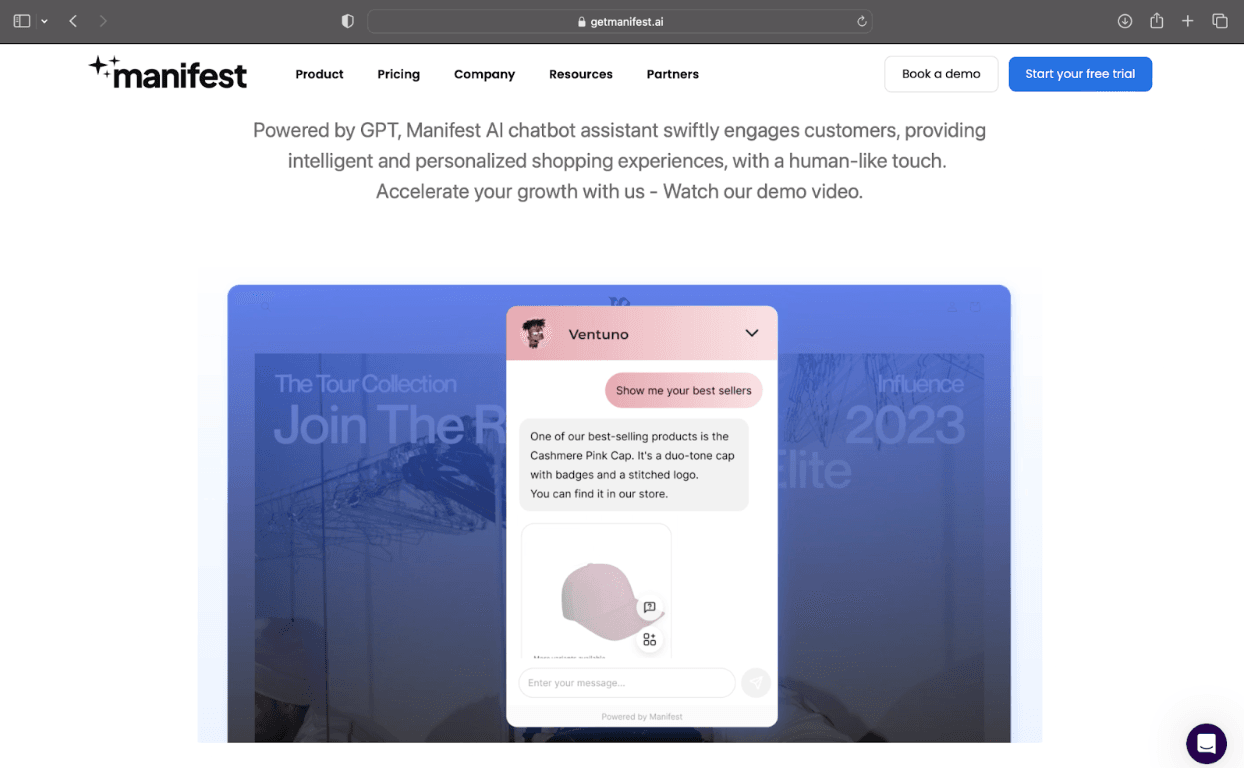
7. SmartSupp
The gist: A smart, functional AI shopping assistant bot, easy to use and good for upselling, with product recommendations and a smart product guide.
Easy to install? Fairly simple setup, with templates that help you design your own bot.
Pre-trained? No.
Integration level: Medium. The bot doesn’t support order status/tracking or cancellations and returns. There are product recommendations and a smart product guide.
Pricing: 2 week free trial Standard plan - 480 CZK / month with annual plan, 690 CZK per month if monthly Pro - 1200 CZK / month with annual plan, 1500 CZK / month with monthly Ultimate - Personalized quote
Automation rate: 50% reduction in the number of repetitive questions you need to answer, but +248% conversion rate boost using chatbot
Personalization: No
Customer recognition: Yes, product recommendations and a smart product guide.
Omnichannel: Yes
Escalation: Yes
Analytics: Strong analytics offering, easy to understand. Provides information on new conversations, answered conversations, closed conversations, average rating and response time. Also usage % (number of chats tagged.)
AI: Yes, an AI chat assistant, AI addressing the visitor, and an AI shopping assistant
Languages: Czech, Slovak, English, German, Spanish, French, Italian, Polish, Hungarian, Dutch
Conclusion: A simple, more personal customer care solution. Good for small businesses, but the lack of order tracking is unfortunate.
